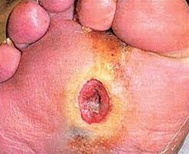
Wound Care Protocols
Wound Care Protocols
Diabetics are not only more susceptible to developing wounds, but those wounds often become infected unless they are treated immediately. Because of common Diabetes complications, such as increased blood sugar levels, nerve damage, and poor circulation, many wounds do not receive the blood, nutrients, and attention that they need in order to heal properly.
While Diabetics can develop serious wounds anywhere, they tend to develop serious wounds on the feet, especially, because of decreased sensitivity in the extremities. Even small wounds, such as blisters, can become huge complications if they go unnoticed and untreated. Early detection and treatment is critical in wound care in order to avoid infection and spreading of the wound.
¥ Dry skin
¥ Elevated blood sugar levels
¥ Bacteria and other dirt
¥ Not treating the wounds immediately
¥ Poor nutrition and lack of essential vitamins and minerals in the diet
If you have a wound or are concerned about getting an infection, there are some simple steps that you should take in order to avoid getting an infection. Those steps include:
If you are concerned about an existing wound or are worried that you may develop a serious wound, contact your doctor immediately. Paying close attention to your body can help to avert serious complications that are associated with Diabetes.
First Ever Study Predicts Outcome For LimbThreatening Infections In Diabetes
Researchers from the University of Washington, Rosalind Franklin University of Medicine and Science, Merck Laboratories, and Mount Sinai School of Medicine have released a study suggesting that specific laboratory and clinical tests can predict outcome of antibiotic therapy for infections in persons with diabetes.
Read more at Medical News.
For more breaking news on Diabetes, click on News Articles.


